
Nitheesh NH
Mainstream Chinese social commerce platforms include WeChat, Weibo and short-video sites such as TikTok, but there are other, lesser-known platforms that brands could consider using for marketing purposes. One of these is Zhihu, a popular social media platform in China to which users turn to find answers to a variety of questions.
 Source: Zhihu/Coresight Research[/caption]
Source: Zhihu/Coresight Research[/caption]
 Olay’s question on Zhihu (left); Chinese actress Chi-ling Lin responds (right)
Olay’s question on Zhihu (left); Chinese actress Chi-ling Lin responds (right)
Source: Zhihu[/caption] 3.Publish Articles and Host Live Sessions There are two other significant features of the Zhihu platform that are useful for retailers: Zhihu Article and Zhihu Column. These functions enable brands to publish in-depth articles targeted at Zhihu users who are looking for more detailed and professional knowledge about a specific topic—this can be effective in business-to-business marketing as well. Users can access these two functions via brands’ official account pages. Zhihu also allows brands to host live sessions, which can be paired with the Zhihu Article and Zhihu Column features. For example, beauty brands could use livestreaming to demonstrate how to use their products and further educate users on product ingredients through published articles. Amazon’s cloud computing platform AWS had published 236 articles on Zhihu as of March 2020. Topics include how to use specific AWS products, such as Amazon Sumerian to create a virtual reality experience and AWS Lambda for coding. These articles are particularly technical and require some professional background in the technology to understand. Since Zhihu users tend to be better educated, articles published on the platform could result in more engagement than if they were published on WeChat or Weibo. 4.Leverage Zhihu’s Advertising Options Zhihu has developed multiple ways of monetizing content—for example, by inserting advertisements and linking to products listed on e-commerce sites. As with all social media platforms, Zhihu also offers pop-up advertising options when the app opens, banner ads on search pages and newsfeed ads within the page’s feed. In September 2019, Zhihu began testing a product-recommendation function that links to products on Alibaba’s Taobao and JD.com, adding Pinduoduo products in February 2020. [caption id="attachment_104988" align="aligncenter" width="700"] Adverts on Zhihu
Adverts on Zhihu
Source: Zhihu[/caption]
What Is Zhihu?
Zhihu (知乎), which translates as “do you know?” was launched in 2011 as a Quora-like online Q&A forum on which questions are posted, answered, liked and shared by users. The platform currently has around 220 million users, who posted a total of 130 million answers as of January 2019. On average, each user spends about 70 minutes per day on Zhihu, according to the company. According to QuestMobile, Zhihu has around 48.7 million monthly active users as of September 2019. Zhihu raised $434 million in a Series F funding round led by short-video platform Kuaishou, and it is planning an IPO this year. Zhihu users tend to be well-educated people with professional backgrounds and strong purchasing power. Zhihu official data shows that more than 80% of users have a bachelor’s degree or above, and 41% have a monthly household income of ¥20,000 (around $2,890) or more. According to the National Bureau of Statistics of China, monthly disposable income in urban households was approximately ¥3,500 ($505) in 2019. With a more educated user base than most social media platforms, the content tends to be more in-depth and of higher quality. It also enjoys higher rates of discussion and interaction compared to other social platforms. Zhihu introduced livestreaming functions and corporate accounts, increasing its value proposition for retailers. [caption id="attachment_104986" align="aligncenter" width="700"] Source: Zhihu/Coresight Research[/caption]
Source: Zhihu/Coresight Research[/caption]
Four Ways Companies Can Leverage Zhihu To Build Brand Awareness
1. Be Active in Q&A Discussions Zhihu started allowing eligible brands and organizations to launch official accounts in 2016; as of January 2019, there were 30,000 official accounts, mostly Asian brands. With an official account, brands can launch Q&A campaigns by looking for questions related to their business or products, commenting on the thread and talking about their products, and even adding images, videos and charts. However, brands need to be cautious not to oversell: Zhihu users are easily turned off by a hard-sell approach, as most go to the platform to discover knowledge-driven content, not advertising. That said, there are many ways in which brands can promote themselves on Zhihu, such as by initiating a thought-provoking question and then engaging with users who respond. One campaign, launched by Alibaba’s Tmall before its 11.11 Global Shopping Festival (known as Singles’ Day) in 2019, started with the company posting a question on Zhihu—“What did you buy recently that brought you the most joy?”—in order to initiate a discussion about consumers’ favorite purchases. Tmall also used the interactive livestreaming feature Zhihu Live, inviting experts and personal shoppers to offer advice on how consumers could get the best deals during Singles’ Day. 2. Leverage KOLs and KOCs In addition to producing their own content, brands can also leverage key opinion leaders (KOLs) and key opinion consumers (KOCs), which is an effective and popular marketing technique in China. Being mentioned by KOLs or KOCs on Zhihu can help brands to build trust among consumers while also increasing brand awareness. Skincare brand Olay posted a question in October 2019 asking women to share how they pursue their dreams regardless of age, inviting female actress Chi-ling Lin and five female KOLs to write about their experiences. The thread attracted over 5 million views and almost 300 responses by March 2, 2020. [caption id="attachment_104987" align="aligncenter" width="700"] Olay’s question on Zhihu (left); Chinese actress Chi-ling Lin responds (right)
Olay’s question on Zhihu (left); Chinese actress Chi-ling Lin responds (right)Source: Zhihu[/caption] 3.Publish Articles and Host Live Sessions There are two other significant features of the Zhihu platform that are useful for retailers: Zhihu Article and Zhihu Column. These functions enable brands to publish in-depth articles targeted at Zhihu users who are looking for more detailed and professional knowledge about a specific topic—this can be effective in business-to-business marketing as well. Users can access these two functions via brands’ official account pages. Zhihu also allows brands to host live sessions, which can be paired with the Zhihu Article and Zhihu Column features. For example, beauty brands could use livestreaming to demonstrate how to use their products and further educate users on product ingredients through published articles. Amazon’s cloud computing platform AWS had published 236 articles on Zhihu as of March 2020. Topics include how to use specific AWS products, such as Amazon Sumerian to create a virtual reality experience and AWS Lambda for coding. These articles are particularly technical and require some professional background in the technology to understand. Since Zhihu users tend to be better educated, articles published on the platform could result in more engagement than if they were published on WeChat or Weibo. 4.Leverage Zhihu’s Advertising Options Zhihu has developed multiple ways of monetizing content—for example, by inserting advertisements and linking to products listed on e-commerce sites. As with all social media platforms, Zhihu also offers pop-up advertising options when the app opens, banner ads on search pages and newsfeed ads within the page’s feed. In September 2019, Zhihu began testing a product-recommendation function that links to products on Alibaba’s Taobao and JD.com, adding Pinduoduo products in February 2020. [caption id="attachment_104988" align="aligncenter" width="700"]
 Adverts on Zhihu
Adverts on ZhihuSource: Zhihu[/caption]